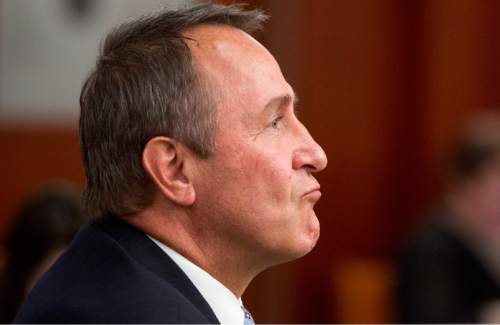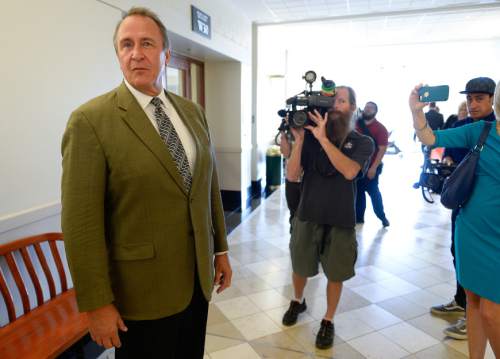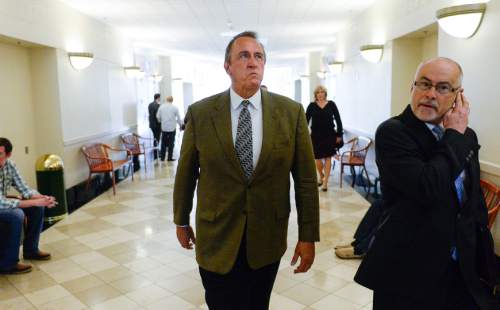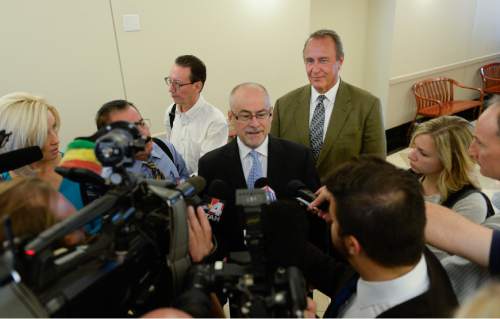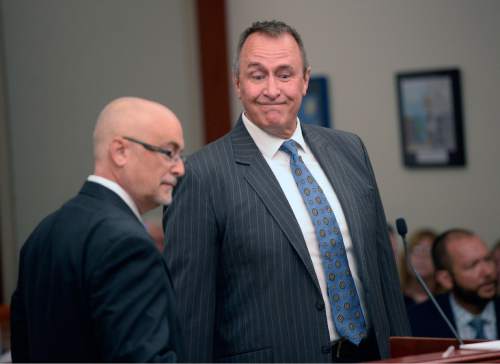This is an archived article that was published on sltrib.com in 2016, and information in the article may be outdated. It is provided only for personal research purposes and may not be reprinted.
After three years living under a cloud of criminal suspicion, Mark Shurtleff awoke Thursday finally free from felony charges but not yet done with his pursuit of the truth.
That includes, he said, telling his version of the events that left the former three-term attorney general staring at multiple criminal counts and a potential 30-year prison term — even if it means testifying before a grand jury or at a criminal trial against former allies, including his handpicked successor, John Swallow.
"I've never been accused of hiding, so, yeah, if [prosecutors] want me to cooperate, if there's something I can add to whatever they're doing, I'm not going to not talk," Shurtleff said. "I'm going to tell the truth."
Shurtleff was in Denver on Wednesday when news broke that 3rd District Judge Elizabeth Hruby-Mills had granted a prosecutor's motion and dismissed the public corruption case filed against him more than two years ago.
That decision left Shurtleff in tears, he said. "There's an elation. I'm floating, so in that respect ... I'm grateful."
But frustration remains.
Since the dismissal came on a motion from Davis County Attorney Troy Rawlings, Shurtleff cannot ask the state to pay his legal fees, which the former GOP officeholder put in the "six-figure" range. Shurtleff said his team is assessing other options to get those bills paid, including a possible civil lawsuit.
The judge's ruling also didn't consider the legal arguments Shurtleff considered important, including his constitutional right to a speedy trial and alleged misconduct by police and prosecutors.
Rawlings, a Republican, sought to dismiss the case July 18, citing an ongoing cooperation agreement in which Shurtleff has agreed to provide information and testify in other matters. The prosecutor also pointed to a recent U.S. Supreme Court ruling in a public corruption case and his inability to obtain key evidence from federal investigators.
"I have nothing but praise for Rawlings," said Shurtleff, himself a prosecutor for more than two decades. "It's a tough thing for a prosecutor to dismiss a case. People are going to question him and his reasons, but he's acted ethically."
Although the details are still being worked out, Shurtleff said he has agreed to cooperate with Rawlings as the prosecutor pursues a wider investigation of possible corruption and misdeeds.
"Rogue Runner," as the probe is known, stems from unanswered questions about the actions and decisions of state and federal authorities who investigated Shurtleff, Swallow and others, including the U.S. attorney's office for Utah and the U.S. Department of Justice's Public Integrity Section. Rawlings also has said he has questions for longtime Sen. Harry Reid, D-Nev., and the campaign of first-term Sen. Mike Lee, R-Utah.
"If I'm called to testify and there's something relevant I can offer, then I'll do it," Shurtleff said. "I've never shied away from that."
In fact, he told the FBI in 2012 about Swallow's possible involvement in an alleged bribe of Reid. Shurtleff also worked as a confidential informant for the bureau in 2007 and 2009 when an associate of a Utah businessman facing felony charges allegedly tried to wiggle out of his legal woes by attempting to bribe the then-attorney general.
"I've been cooperating since 2007," he said. "I went right to the FBI."
Rawlings said the scope of the Rogue Runner case is "broader and deeper" than generally known.
"With the significant assistance of Mr. Shurtleff, the state of Utah intends to explore what other entities and agencies have determined to ignore," he said. "In fact, among other communications, this particular prosecutor even has an email from one of those entities imploring that I back off of at least one of the most significant areas where Mark Shurtleff can valuably assist."
Shurtleff said he has other work to do as well — namely repairing the damage that three years of headlines has done to his reputation. No media outlets, including The Salt Lake Tribune, got the story right, he said. Instead, they perpetuated a "one-sided and false narrative."
"I hold The Tribune accountable for that," Shurtleff said, adding that he believes the paper used the story as a way to sell its product after years of declining revenues and staff layoffs.
The paper made it even worse, he added, by naming Salt Lake County District Attorney Sim Gill, who is prosecuting Swallow, its "Utahn of the Year" in 2013.
At least two government reports — from a special Utah House committee and the lieutenant governor's office — and an independent inquiry for the Utah Attorney General's Office — found varying degrees of questionable conduct by Swallow and Shurtleff.
The House report, for one, alleged a pay-to-play environment essentially had put a for-sale sign on the attorney general's office. State prosecutors then brought criminal charges against the two former attorneys general in 2014.
Shurtleff questions the findings of those investigators and prosecutors.
"The Salt Lake Tribune continues to harp on these 'facts' as if they are true," he said. "And they're just not."
Shurtleff's lawyers have alleged misconduct by state and federal investigators, asserting that they presented false or misleading statements and material omissions of facts to obtain search warrants — information prosecutors also used to bring charges.
Shurtleff said his legal team has evidence that investigators committed perjury in sworn statements and plans to soon make that information public — something he said he has waited years to do.
The former attorney general said he also wants to reveal examples of the thousands of pages of evidence provided to his team by federal investigators, much of which was irrelevant and unusable. One hard drive, he said, contained more than 530,000 images, many of them pictures of fruit, movie posters and landscapes unrelated to the case.
"People need to realize the games they play," he said. "They bury us in documents and then claim to have turned over terabytes of stuff. That makes people think there's that much evidence against Shurtleff."
Shurtleff said he has only theories about why investigators pursued him. "I have my guesses," he said. "But ... I may never know until we perhaps get them on the stand."
While in office, Shurtleff said, he made many pronouncements that the attorney general's office was not "for sale."
"Maybe my mistake was in becoming arrogant and thinking that I could not be touched," he said. "So then I allowed myself to be put in situations where people might see something that gave the appearance of impropriety."
Despite his ordeal, Shurtleff said his faith in the justice system remains mostly intact. Only the actions of investigators and Gill, a Democrat who Shurtleff believes pursued the case for political and personal reasons, leave him disappointed and disheartened.
Gill contends the charges were based solely on the evidence, not politics. He noted the Utah-based investigations were all controlled by the state's dominant Republican Party, adding that neither he nor Rawlings had any control over the federal agencies.
"Mr. Shurtleff gives me far greater power," Gill said, "than anybody else has ever given me."


